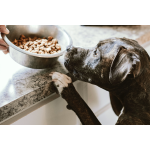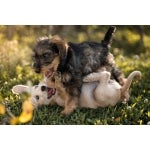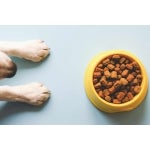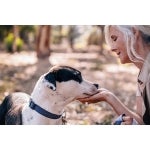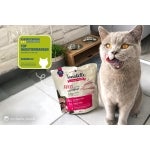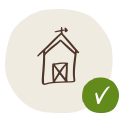
Most dog owners already know that there are some foods that our beloved four-legged friends are not allowed to eat. These include chocolate and alcohol. But the list is much longer.
Dangers for dogs are not only lurking at home. In the garden or on a daily walk, dangers can arise from poisoned bait or poisonous plants and other substances. In spring, many early bloomers are particularly poisonous for our beloved four-legged friends.
But where do we need to be particularly careful?
Which foods are dogs not allowed to eat?
Which fruit and vegetables are taboo for dogs?
This information and much more, you'll find in the following handy list. Moreover we'll show you the most well-known foods, plants and substances* that are toxic to dogs
List of poisonous foods (including fruit and vegetables) for dogs: *
⊗ Fruit seeds and stone fruit, among others:
- Cherries
- Plums
- Mirabelle plums
- Peaches
- Apple seeds
⊗ Grapes and raisins
⊗ Avocado
⊗ Citrus fruits
⊗ Pineapple
⊗ Onion
⊗ Shadow plants (raw potatoes, etc.)
⊗ raw beans
⊗ Pepper
⊗ Garlic
⊗ Coffee and black tea
⊗ Chocolate
⊗ Sweetener - xylitol, birch sugar (often found in sugar-free chewing gum, sweets, baked goods, medicines and food supplements)
⊗ Raw pork (danger from the Aujetzky virus)
⊗ Alcohol
⊗ Nicotine
List of poisonous plants: *
Many early bloomers are poisonous, especially in spring. Below is a small selection of the most well-known poisonous plants in spring:
⊗ Crocuses
⊗ Hyacinths
⊗ Lilies of the valley
⊗ Daffodils
⊗ Primroses
⊗ Snowdrops
⊗ Grape hyacinths
⊗ Tulips
Poisonous plants from the garden:
⊗ Boxwood
⊗ Ivy
⊗ Yew
⊗ Angel's trumpet
⊗ Cherry laurel
⊗ Oleander
⊗ Rhododendron
⊗ Holly tree
⊗ Hydrangea
⊗ Geranium
Poisonous houseplants:
⊗ Agave
⊗ Amaryllis
⊗ Monstera
⊗ Lilies
⊗ Orchids
⊗ Poinsettia
List of other toxic substances: *
⊗ Poison bait (laced with toxic substances)
⊗ Rat poison / slug pellets
⊗ Herbicides, insecticides, fungicides
⊗ Special care after working the agricultural fields
⊗ Carrion and waste
⊗ Poisoned small animals, such as mice
⊗ Medication (paracetamol, ibuprofen, etc.)
What symptoms can occur in case of poisoning?
• Diarrhea and vomiting (can also be bloody)
• Nausea and salivation
• Shortness of breath
• Seizures, muscle tremors, signs of paralysis
• Restlessness
• Apathy
• Pale mucous membranes
• Prayer position (cat's hump, associated with very severe abdominal pain)
What should I do if my dog is poisoned?
If poisoning is suspected, contact a vet IMMEDIATELY, on weekends and public holidays contact the emergency veterinary service. If in doubt, the poison control center can also help you. You can find a list of poison control numbers here.
How can I take precautions?
- ‚Anti-poison bait training‘
The best prevention can be achieved with special training. There are many dog schools that already offer 'anti-poison bait training'. Here, dog owners learn how to protect their dogs from ingesting toxic and unhealthy substances, food and plants and how to train them to do so. - Poison bait alert app for the phone
There are already apps that trigger an alarm if poisoned bait or toxic substances are found in your region. The 'Dogorama' app is recommended here, for example. - Save the telephone numbers of vets and veterinary clinics in your region, so that you can contact them immediately in an emergency.
* Please note that these lists are not guaranteed to be complete.
Do you have further questions about dog food?
Feel free to contact our nutrition experts. They will be happy to help you by e-mail and by telephone via our free hotline.
Phone: +49 (0) 800 333 8 222 (free of charge)
E-Mail: expertenteam@bosch-tiernahrung.de
Monday - Thursday: 7.30 - 12 o'clock & 13 - 16 o'clock
Friday: 7.30 - 12 o'clock & 13 - 15 o'clock


